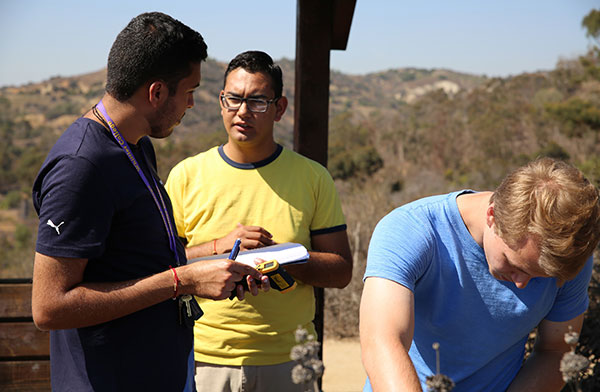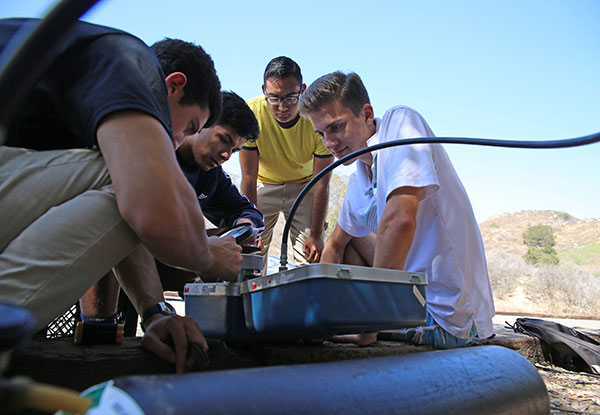 At a point when STEM (science, technology, engineering, and mathematics) graduates are crucially needed, first-year students at Whittier College are learning these disciplines hands-on in several new research-focused writing seminars.
At a point when STEM (science, technology, engineering, and mathematics) graduates are crucially needed, first-year students at Whittier College are learning these disciplines hands-on in several new research-focused writing seminars.
A competitive National Science Foundation (NSF) grant in the amount of $593,000, was awarded to a partnership between Whittier and Pepperdine University. The collaborative three-year project, Students as Scholars (SAS), implements this hands-on, research-based approach to scientific first-year courses, which other institutions can hopefully adopt as well.
As first-year students take math, chemistry, and similar courses, the ways those fields intersect in the real world are not always apparent. "In the classroom, the science lessons are in silos; but research brings them together," said Whittier College Professor of Biology Cheryl Swift who serves as the co-principal investigator for the project. “You’re actually putting that knowledge to work for you.”
As part of this project, Whittier students work in groups to design and execute independent research projects under the guidance of peer mentors and faculty. For instance, students in Swift’s seminar, “Coastal Sage Scrub: A Habitat on the Brink of Extinction,” have devised their own biological experiments and tested them on the threatened sage shrubs in the hills east of the College.
Biology major Emily Carranza ’20 was there, hiking among the dry brush and applying the techniques she had learned in class. The exercise was “really helpful,” she said, as she gained first-hand experience with the tools and practices that scientists use in the field.
Sylvia Vetrone, James Irvine Foundation Chair in Biological Sciences, is teaching a seminar on how the immune system is harnessed to fight cancer, in which her students test the effects of nutritional supplements. Her first-year students "are actually doing lab work" and are really enjoying that aspect of the seminar, while also getting a head start on scientific writing, Vetrone said.
“It’s been an amazing experience. I didn’t know that undergraduate students, especially first-years, could take such a specialized class,” said Danielle Gutierrez ’20, who recently decided to switch from majoring in kinesiology to biology because of the course.
The College’s third seminar, on aging, is taught by Hector Valenzuela, the Roy E. and Marie G. Campbell Distinguished Associate Professor of Biology. Next year, Whittier will add a fourth seminar on insects led by David Mbora, assistant professor of biology and environmental science.
 The seminars' hands-on approach aims to retain more students in STEM disciplines. It’s a pressing need: almost half of STEM-major students leave those fields within several years, according to a 2014 U.S. Department of Education report that examined attrition rates from 2003 to 2009.
The seminars' hands-on approach aims to retain more students in STEM disciplines. It’s a pressing need: almost half of STEM-major students leave those fields within several years, according to a 2014 U.S. Department of Education report that examined attrition rates from 2003 to 2009.
Moreover, an emerging body of literature suggests that STEM professors should change the way they teach, Swift said. The literature suggests re-emphasizing the scientific process by learning through experience, rather than rote memorization of facts before seeing them in action through experiments and research.
“It’s working,” said Swift, who’s noticed her students having fun as they explore the sciences. “… I see them becoming more confident in their thinking. They’re certainly creative.”
During the three-year grant period, the two sites will be creating a toolbox and a set of best practices that can be shared with other colleges and universities via conferences and other professional gatherings. According to Swift, if the model can work at both Whittier, a small private college, and Pepperdine, a larger school with different student demographics, it can be reproduced at a wide variety of institutions.
Whittier’s location has provided great opportunities for the program. Not only are the nearby hills ripe for important environmental work, but the seminars are also taking advantage of world-class nearby resources like the San Diego Zoo Safari Park. Last week, all three classes enjoyed a behind-the-scenes tour of the park’s rhino facility. Senior zoo keeper and alumna Jonnie Capiro ‘01 led the tour and provided comprehensive lectures on captive breeding programs and their challenges—from the cellular level to ecosystems.
The experience inspired Carranza ’20 so much, she’s considering new options in her career path: “When I came into college, I was trying to be a marine biologist. After visiting the safari park, I want to see what it takes to be a zoologist.”
In November, all three seminar participants attended the Southern California Conferences for Undergraduate Research (SCCUR) at the University of California, Riverside.